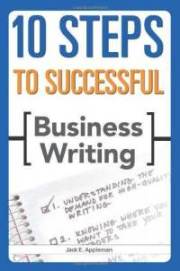Training to Communicate
February 22, 2013 3 Comments
Anyone that knows me well knows that I have a passion for writing – in fact, it’s really a passion for all things communication (including speaking, video, social media, etc.). As a blogger, I traffic in a lot of written material. Much of what I see is, quite frankly, pretty amateurish.
 Writing clearly and succinctly is crucial to work effectiveness. And it’s a rarely-trained skill. It doesn’t matter what position people occupy in their profession. Everyone from the newly-hired salesperson to the CEO needs to sharpen communication skills, if they want to be viewed as professionals (see this recent post by Dave Kerpen).
Writing clearly and succinctly is crucial to work effectiveness. And it’s a rarely-trained skill. It doesn’t matter what position people occupy in their profession. Everyone from the newly-hired salesperson to the CEO needs to sharpen communication skills, if they want to be viewed as professionals (see this recent post by Dave Kerpen).
If people are spending an average of 28% of their time dealing with e-mail – then just improving that one area of business writing can return a lot of potential productivity gains!
In the past month, I’ve sat down with a couple of great providers who do corporate training on communications/writing skills. I found myself nodding so vigorously during discussions that it’s a wonder I didn’t end up at the chiropractor’s office! As I underscore in my Vendor/Project Success workshops, the basic principles of project and vendor management will be used in all future career areas – just like learning to drive a car, it’s an “evergreen” skill set. Writing and communicating clearly? –even more so.
Clear communications lead to clear actions. Foggy communications lead to misunderstandings, back-and-forth clarifications, and frustration.
Let’s train ourselves and our people how to effectively move thoughts to the keyboard and beyond (and if you need a communications training vendor/provider recommendation, just let me know – steve [at] connectionagent dot com). It can never be wrong to sharpen this skill!
 Also, here’s a book recommendation for you. 10 Steps to Successful Business Writing* (by Jack Appleman) is a compact, simple-to-absorb volume that gives practical, step-by-step advice on how to write more clearly.
Also, here’s a book recommendation for you. 10 Steps to Successful Business Writing* (by Jack Appleman) is a compact, simple-to-absorb volume that gives practical, step-by-step advice on how to write more clearly.
The opening paragraph in the introduction says it all:
Successful business writing starts with simplicity. The beauty of simplicity is that it can produce results faster.
With chapters like Know Where You’re Taking Your Readers; Be Explicit, Clear, and Concise; Grab Your Readers’ Attention; and Master The Documents You Use Most Often; this book dives immediately into straightforward advice with plenty of practical application.
I’ve spent a good bit of time with Jack lately (we have a common bond in the realms of clarity and training!), and he has shared with me how he can also partner with corporations and provide valuable training for employees. If you’re interested in Jack’s services, let me know and I’ll make the connection.
*Amazon affiliate link
Image: FreeDigitalPhotos.net
Postscript: Just saw this nice summary about how to write effective e-mails that people won’t ignore, by Bryan Garner via HBR blog.







Recent Comments